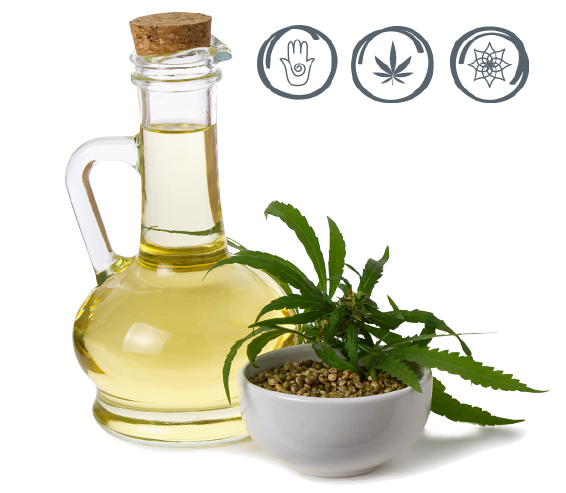Hemp is the name given to cannabis varieties that do not exceed 0.3% Delta-9 THC concentration by a dry weight basis. THC or tetrahydrocannabinol is the cannabinoid responsible for a psychoactive reaction. The Agricultural Act of 2014 allowed for the experimental growing of hemp through pilot programs governed by individual states and in 2018 the US Farm Bill federally legalized hemp as an agricultural commodity. Hemp can only be grown, by individuals, businesses, or institutions that are licensed by their state or the USDA.
Benefits may include relief from stress, anxiety, depression, insomnia, and pain. However, CBD products have not been evaluated by the Food and Drug Administration (FDA) and claims cannot be made that these products will treat, heal, or cure any disease.
Taken at recommended dosage, you will not have any psychoactive reaction. The percentage of THC in a single dose of Full Spectrum CBD oil is far too low to feel a psychoactive effect.
The recommended dose depends on your body’s needs. Some find the relief they desire from just a few drops, but others often need up to a full 1 ml dropper to achieve desired results. It also depends on the strength of the CBD product. It’s best to start out with just a few drops per day of a low-strength oil to determine your needs.
To understand a product’s strength and dose, it is important to know that the amount of cannabinoids in our products is measured by weight.
- For example:
- A 30 ml bottle of 1000 mg Full Spectrum CBD oil contains at least 1000 mg of the CBD cannabinoid, as well as CBC, CBG, CBN, and less than 0.3% Delta-9 THC.
- Each 1 ml dose contains 33 mg of CBD
- Our droppers are marked in 0.25 ml increments
(0.25, 0.50, 0.75, and 1), so using our 1,000 mg example:
- 0.25 ml contains 8.25 mg of CBD
- 0.5 ml contains 16.5 mg of CBD
- 0.75 ml contain of CBD
- These same dose numbers apply to 15 ml bottle with 500 mg CBD
(500/15 = 33)
Generally, CBD oil is taken by applying the desired amount under your tongue and holding for approximately two minutes before swallowing. This allows the cannabinoids to be absorbed through the soft tissue in your mouth. If CBD oil is swallowed immediately or consumed in a food or beverage, the cannabinoids will be broken down quickly in the stomach and may not be as effective.
Relief may be noticed within thirty minutes of consumption or could take several hours to take effect.
CBD often gives the body a calming sensation that may reduce stress, anxiety, or depression. Inflammation, which often is associated with pain, seems to be diminished by the presence of CBD.
Taking CBD oil daily may be most effective in maintaining homeostasis, a steady-state of balance of your body’s internal systems. Topically applying CBD products is also an effective way to achieve relief. This approach is normally used to manage joint pain resulting from arthritis, strains, sprains, or bruises. Some individuals may even notice diminished pain from applying topical CBD to bee stings, mosquito bites, and sunburn. Often, relief is felt within minutes.
Another way to introduce CBD to your body is through inhalation of the incinerated flower parts. In other words, smoking the raw flower. This results in an almost immediate effect of the cannabinoids since they are absorbed quickly into the bloodstream through the lungs. We do offer hemp flower buds for sale, as well as pre-rolled hemp joints.
When taking a full-spectrum CBD oil, your body has access to all the compounds present in the cannabis (hemp) plant. It is believed by some, that these compounds work in unison for maximum benefit to your body. This theory is referred to as the Entourage Effect.
It is very likely that one would test positive for the presence of THC if a Full Spectrum CBD product was used within the last thirty days. CBD and CBG isolate products do not contain any trace of THC.
Use of Delta-8 and Delta-10 will definitively show up in a drug test as THC.
Delta-8 and Delta-10 THC are hemp derived cannabinoids capable of inducing a mild-to-moderate high depending on the dose. However, Delta-10’s high is much milder than Delta-8 THC and better for first-time cannabis users who want subtle euphoric effects. Both are legal to buy in North Carolina.
Delta-8 THC and Delta-10 THC are both analogs of Delta-9 THC (the usual THC you smoke) and belong to the family of “tetrahydrocannabinol” alongside THCA, THCV, and THCP. Both are legal to purchase and possess in North Carolina.
- Delta-8 is roughly 50-66% as potent as Delta-9, while Delta-10 is considerably less potent (approximately 20-30% less than Delta-8).
- Delta-8 and Delta-10 are both molecularly similar to Delta-9 aside from small differences in their molecular structures.
- Due to slight differences in their molecular structures, Delta-8 and Delta-10 are not the same cannabinoid and behave differently inside your body when consumed.
- Delta-8 generally causes a sedative effect whereas Delta-10 results in a more energizing and focused sensation.
- Neither Delta-8 nor Delta-10 causes significant side effects in mild to moderate doses. Delta-8 may cause anxiety, paranoia, and fear in high doses.
- Delta-8 is said to have possible antiemetic, appetite-stimulating, anti-inflammatory, analgesic, and social qualities. Research on Delta-10 is almost non-existent.
- Hemp-derived Delta-8 and Delta-10 are also federally legal and protected under the 2018 Farm Bill.
- Delta-8 and Delta-10 interact with your endocannabinoid system and its receptors the same way as Delta-9 THC. However, Delta-8 and Delta-10 have less affinity with your cannabinoid receptors than Delta-9, resulting in a weaker but no less enjoyable high with fewer side effects.


